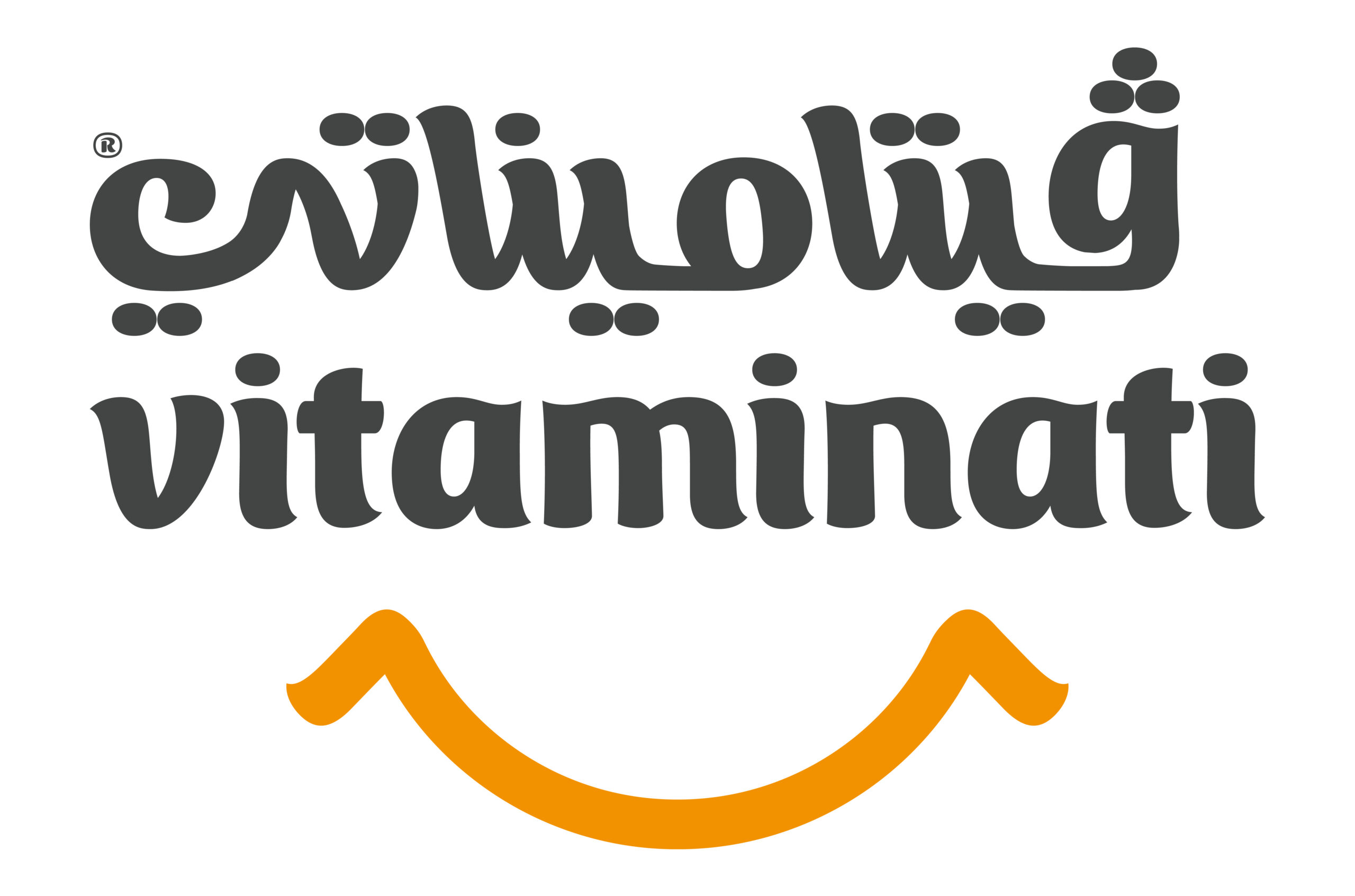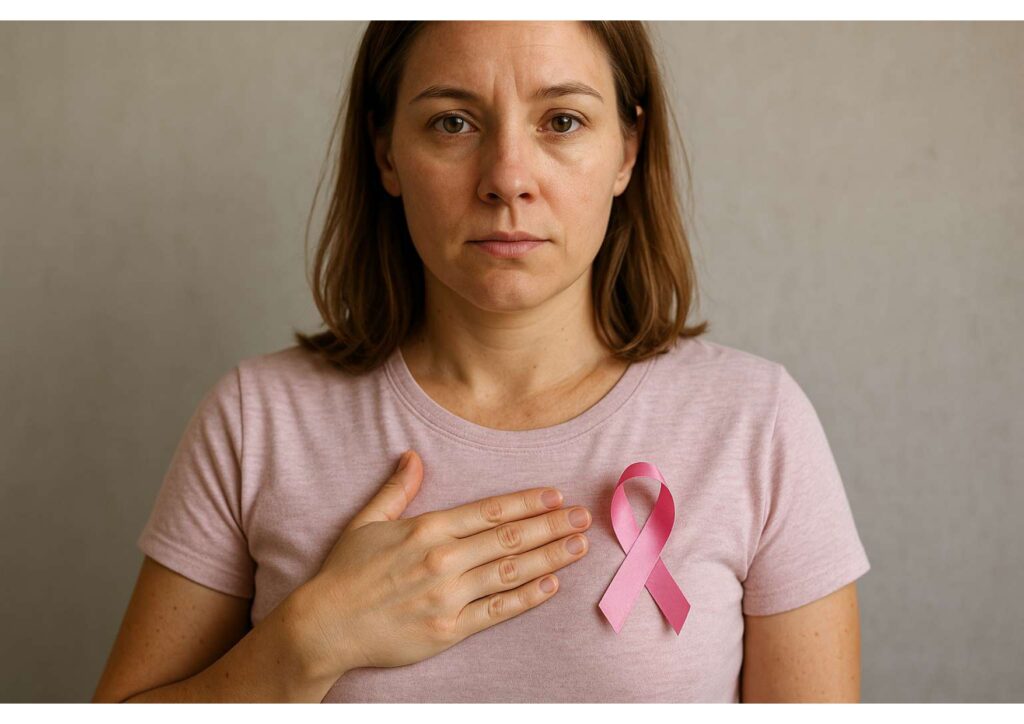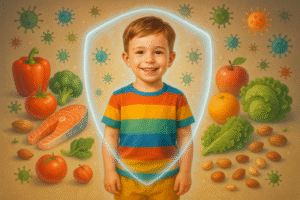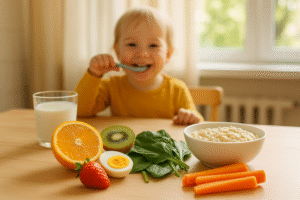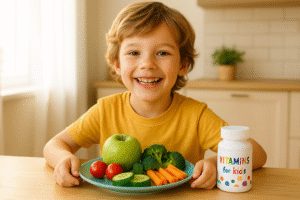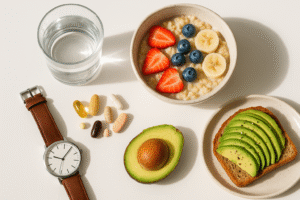The American Cancer Society (ACS) estimates that nearly 30–40% of cancers are linked to diet and lifestyle choices. Among women, breast cancer is the most common cancer worldwide, and while genetics contribute to risk, modifiable lifestyle factors like diet, exercise, alcohol use, and weight management can make a powerful difference.
October, known as Pink October, is more than a month of awareness campaigns — it’s a reminder that prevention and empowerment start with everyday choices. Nutrition is not a “cure” for breast cancer, but a protective tool supported by strong evidence. Both ACS guidelines and peer-reviewed studies, highlight how dietary patterns and specific nutrients influence breast health.
In this comprehensive guide, we’ll explore:
-
ACS-backed prevention guidelines
-
Research-supported roles of fiber, antioxidants, vitamin D, omega-3s
-
Foods and habits to limit for risk reduction
-
Practical lifestyle tips you can start today
Table of Contents
Toggle1. Maintaining a Healthy Weight to prevent Breast Cancer.
Excess weight is one of the most significant risk factors for breast cancer after menopause.
-
Fat tissue produces estrogen, which can stimulate breast cancer cell growth.
-
Obesity also raises insulin levels and chronic inflammation, creating an environment favorable for cancer.
Practical strategies for weight control:
-
Eat slowly and mindfully.
-
Focus on nutrient-dense foods (vegetables, whole grains, lean proteins).
-
Avoid sugary drinks and high-calorie snacks.
Science-backed insight: According to ACS, weight gain during adulthood significantly increases risk, so maintaining stable weight throughout life is more protective than late attempts at weight loss.
2. Physical Activity and Hormonal Balance to prevent Breast Cancer.
Exercise is not just for fitness — it’s a cancer prevention tool.
-
ACS recommendation: 150–300 minutes of moderate exercise weekly (e.g., brisk walking, dancing, cycling).
-
Exercise lowers estrogen and insulin, boosts immune function, and improves mood and energy.
-
Even small lifestyle changes — like using stairs instead of elevators — add up.
Practical takeaway: Aim for 30 minutes daily, and build it into activities you enjoy, like walking with friends or yoga.
3. Plant-Based Eating and Antioxidants for Breast Cancer risk reduction.
Plant-rich diets form the foundation of cancer prevention.
-
ACS advice: Fill two-thirds of your plate with vegetables, fruits, and whole grains.
-
Flavonoids and polyphenols (berries, citrus, onions, kale) neutralize oxidative stress.
-
Carotenoids (carrots, spinach, sweet potatoes) may reduce estrogen-driven tumor growth.
-
Practical example: A breakfast of oatmeal with berries and nuts, or a lunch bowl of quinoa, spinach, and roasted vegetables, provides antioxidants and fiber in one meal.
4. Whole Grains and Dietary Fiber.
Fiber-rich diets support hormonal balance and digestive health.
-
ACS recommendation: Prioritize whole grains like brown rice, quinoa, oats.
-
PMC evidence:
-
Fiber lowers circulating estrogen by binding it in the gut and aiding excretion.
-
Higher fiber intake is associated with reduced breast cancer risk in observational studies.
-
Daily goal: Women should aim for 25–30 grams of fiber per day, from foods, not supplements.
5. Healthy Fats and Omega-3 Fatty Acids.
Not all fats are equal.
-
ACS: Advises limiting unhealthy fats (saturated and trans fats).
-
PMC research: Omega-3 fatty acids (EPA, DHA, ALA) — found in fatty fish, flaxseeds, walnuts — show anti-inflammatory properties and may slow tumor progression.
Tip: Replace fried foods and processed oils with olive oil, avocado, or fatty fish.
6. Vitamin D and Breast Health.
Vitamin D regulates cell growth and immune function.
-
PMC review: Adequate vitamin D levels are associated with lower breast cancer incidence in some studies, though results vary.
-
Sources: sunlight, fortified foods, oily fish, and supplements when clinically indicated.
Tip: Ask your doctor for a vitamin D test — deficiency is common, especially in women with limited sun exposure.
7. Alcohol and Breast Cancer Risk.
Alcohol is one of the most well-established dietary risk factors for breast cancer.
-
ACS evidence: Even one alcoholic drink per day increases breast cancer risk by ~7–10%.
-
Alcohol raises estrogen levels and damages DNA in cells.
Recommendation: Best to avoid alcohol altogether, or limit to an occasional drink in social settings.
8. Foods and Patterns to Limit.
Both ACS and scientific research caution against:
-
Red and processed meats → linked to inflammation and higher cancer risk.
-
Sugary drinks and sweets → fuel obesity and insulin resistance.
-
Highly processed foods → often high in unhealthy fats, sodium, and additives.
Smart swaps:
-
Replace soda with sparkling water and lemon.
-
Swap deli meats with grilled chicken or beans.
-
Choose whole-food snacks like fruit and nuts.
9. Building a Breast-Protective Diet
A prevention-oriented diet isn’t restrictive — it’s balanced:
✔️ Base meals on plants: vegetables, fruits, legumes.
✔️ Include whole grains and fiber daily.
✔️ Choose lean proteins: fish, poultry, beans.
✔️ Use healthy fats like olive oil, nuts, omega-3s.
❌ Avoid alcohol, processed meats, excess sugar, and refined carbs.
This is consistent with the Mediterranean diet pattern, which has been associated with lower cancer incidence in population studies.
10. Beyond Diet: The Role of Awareness and Screening
While nutrition plays a major role, it should be combined with:
-
Regular mammograms and screenings (per ACS guidelines, starting at age 40–45 depending on risk).
-
Family history assessment (BRCA mutations increase risk).
-
Community support and awareness campaigns like Pink October.
FAQs on Nutrition and Breast Cancer Prevention
1. Does sugar directly cause breast cancer?
No single food “causes” cancer. However, high-sugar diets contribute to obesity and insulin resistance, both risk factors for breast cancer. Limiting added sugars is protective.
2. Is alcohol safe in moderation?
According to ACS, even low alcohol intake raises risk. The safest choice for prevention is no alcohol, but if consumed, keep it to rare occasions.
3. Can supplements replace a healthy diet?
Supplements like vitamin D may help in deficiency, but whole foods (fruits, vegetables, whole grains) provide a complex mix of protective compounds that supplements cannot fully replicate.
4. Are plant-based diets more protective?
Yes. Diets rich in vegetables, fruits, legumes, and whole grains lower cancer risk. However, moderate inclusion of fish, poultry, and dairy can still be part of a healthy, balanced diet.
5. What about dairy and breast cancer risk?
Evidence is mixed. Current research does not show strong links between dairy and increased breast cancer risk. Low-fat or moderate dairy consumption can fit into a balanced diet.
6. Can losing weight later in life still help?
Yes. Weight loss after menopause can lower breast cancer risk, even if weight gain occurred earlier. Prevention is most effective with lifelong healthy weight maintenance, but it’s never too late to benefit.
Conclusion: Nutrition and Awareness as Dual Shields in Pink October
There is no magic food that guarantees prevention, but a healthy lifestyle dramatically lowers breast cancer risk.
-
From the ACS: maintain a healthy weight, stay active, eat more plants, limit alcohol, and reduce processed foods.
-
From scientific research (PMC): fiber, antioxidants, omega-3s, and vitamin D provide promising protective effects.
This Pink October, let’s turn awareness into action — through education, lifestyle changes, and community support.
Share this guide to empower women with science-backed knowledge on breast cancer prevention.
References:
PharmD with expertise in pharmaceuticals and a passion for making medical knowledge clear, accurate and accessible to all
